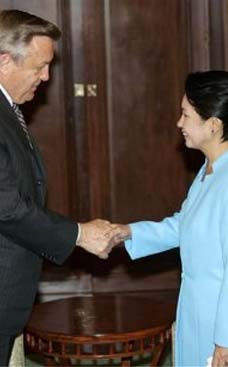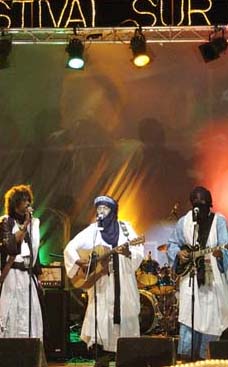
When I joined the Peace Corps, according to the Myers-Briggs personality type indicator, I was an INTJ: introverted intuitive thinking judging. Two years later, upon my return to the U.S., I checked out as an ENFJ: extroverted intuitive feeling judging. Living in an unfamiliar culture heightened my awareness of everything—language, color, smell, and sound. Day after day, these details were pressed upon me; sometimes the intensity felt unbearable, but I knew it was making my soul rich. Although I was raised to be “tough,” a writer can never have too much tenacity, and in this respect, heating my own bathwater, negotiating for my taxis in a foreign tongue, and sidestepping pickpockets gave me the muscle to stay with my manuscripts. As a white southerner in Africa, I experienced what my religious studies professor at UNC called “being the other.” Once, when I walked into a remote village, a small child screamed and tried to hide, thinking I was a ghost. Other children would rub my skin, to see if the white color came off. I identified with their reactions because I had felt a similar terror and fascination back at East Rome Elementary School.
Q&A With Senegal RPCV Melanie Sumner, author of “Wildwood”
Online Extra: Q&A With Melanie Sumner
Melanie Sumner, author of “Wildwood,” talks to Atlanta Magazine’s Amanda K. Brown about working for the Peace Corps, traveling Route 66, and returning to Georgia after years away.
How did your childhood in Rome, Georgia, affect your writing? Was it during this time that you realized you wanted to be, could be, a writer?
Although I haven't always taken advantage of it, I've had the perfect education for a writer. At Darlington School in Rome, it was cool to be smart. Dedicated teachers, small classrooms, a hard-core curriculum, and parents who made me do my homework gave me such an advantage. Going to high school with boarding students from all over the world exposed me to other cultures; I had friends from India, Saudi Arabia, and Australia, and those associations helped me escape the conventions of a small-town mentality. It was a good education for anyone, but what made it perfect, for a writer, happened back at East Rome Elementary School from 1970 to 1973, when I attended the first through third grades there.
The school was a redbrick tomb with hissing radiators and wooden floors that echoed. A woman with the largest behind I had ever seen cleaned our vomit off the floor with sawdust and threatened us with paddlings. Coming from Ohio, I had never seen black people up close, and I was scared of them until I made friends with Tammy, who let me play with her hair. The classes were huge, and the children who were already failures in life sat in the back and snickered until the teacher stopped calling on them. When a student came to school barefoot or didn't have a phone number, the teacher got mad, and we all listened to the child explain payday; apparently, some fathers lived in jail.
You spent several years in Senegal teaching English for the Peace Corps. How did that experience change you as a writer?
When I joined the Peace Corps, according to the Myers-Briggs personality type indicator, I was an INTJ: introverted intuitive thinking judging. Two years later, upon my return to the U.S., I checked out as an ENFJ: extroverted intuitive feeling judging. Living in an unfamiliar culture heightened my awareness of everything—language, color, smell, and sound. Day after day, these details were pressed upon me; sometimes the intensity felt unbearable, but I knew it was making my soul rich. Although I was raised to be “tough,” a writer can never have too much tenacity, and in this respect, heating my own bathwater, negotiating for my taxis in a foreign tongue, and sidestepping pickpockets gave me the muscle to stay with my manuscripts.
As a white southerner in Africa, I experienced what my religious studies professor at UNC called “being the other.” Once, when I walked into a remote village, a small child screamed and tried to hide, thinking I was a ghost. Other children would rub my skin, to see if the white color came off. I identified with their reactions because I had felt a similar terror and fascination back at East Rome Elementary School.
You spent a good portion of your life in New Mexico. How did that come about?
In 1996, I married David Marr, and we headed west until we hit Alaska, where we spent two years doing sundry jobs; weather reporting in the bush, butchering in a grocery store, selling ice cream cones in a kiosk. At the first crack of spring melt, we put our 6-month-old baby Zoe in the car and headed out [to New Mexico], funded by an advance from The New York Times Sophisticated Traveler, whose editor had agreed to pay us to sample pie at diners all along Route 66.
Your first novel, The School of Beauty and Charm, is set in a North Georgia town that seems suspiciously like Rome. When you returned from New Mexico to live there, did you feel any You Can’t Go Home Again–like backlash? What had absolutely not changed since you left?
When you come back to your hometown to live after 20 years, you recognize everyone, but it's like recognizing them in age-progression photographs. At a reunion, you are prepared to encounter certain people (and be encountered), but when you wander through your old town, faces pop up and surprise you. The town has aged well; the lovely, picturesque buildings downtown have been restored and maintained, and at the same time, the mental scope of the town has widened to include a small but influential group of progressive thinkers.
Your recently finished second novel, Christ in the Desert, takes place in northern New Mexico. What’s the difference, from a personal standpoint, between writing about New Mexico and writing about Georgia?
Although I grew up in Georgia, I often feel like a stranger in the South: gawkish, blurting, shy. I identify with Louise Peppers, the protagonist of The School of Beauty and Charm, who believes that when God spots her in Counterpoint, Georgia, he sends a tornado to sweep her out. I'm most comfortable as an expatriate Southerner; when I live beyond the Mason-Dixon line, I tend to befriend people from Georgia, Louisiana, North Carolina—I don't know why. I love the language of the South. One of my favorite lines is, “I wouldn't have said it was, and I wouldn't have said it wasn't.” People tell stories; they posture, play with words. Art is the nature of the Southerner.
I must have lived in northern New Mexico in another lifetime. Walking across a mesa, climbing a rock, or just driving under that huge blue sky, I am home. For some reason, I identify with the Native American culture, which has been partially preserved in the West. The spare writing style of Christ in the Desert mirrors that uncluttered landscape. Every mark on the page takes on significance, but at the same time, nothing is permanent. The wind blows it all away.
Which writers, fiction and nonfiction, influenced you most?
Flannery O'Connor taught me how to write a sentence and then a short story. The late Max Steele, my creative writing professor at UNC-Chapel Hill, expounded on her teachings. Tennessee Williams, William Faulkner, and E.B. White gave me lessons on style, and Gabriel Garcia Marquez allowed me to color outside the lines. Ernest Hemingway and Cormac McCarthy worked with me on dialogue, and Willa Cather on landscape. Tolstoy, Dostoyevsky, Pearl S. Buck, Sherlock Holmes, and Ha Jin have shown me how to plot. For development of character, I study Kazuo Ishiguro and one of my new favorites, Mark Haddon's The Curious Incident of the Dog in the Night-Time.
You are quoted as saying of “Wildwood,” “ Buddy dies to one life and is born into another.” How would you react if you were “born into” Wildwood?
Buddy's move from New Mexico to Georgia parallels my own. The petroglyphs on rocks in New Mexico ultimately gave him script he can use to decipher the codes of his new life, but he has to become willing to rethink everything. The deer [at the end of the story] that looks like another tacky yard animal until it moves illustrates Alfred Korzbyski's dictum, "the map is not the territory."
Your short story “Killing the Cat” is narrated by a man whose wife dies of Amyotrophic Lateral Sclerosis (ALS), otherwise known as Lou Gehrig’s Disease. I read that writing this story was a way for you to deal with the death of your husband, David, from ALS. If you don’t mind me asking, what was this process like?
Writing has always helped me find in order in chaos. Watching the man I loved die from this sudden and horrible illness shattered my conception of God and everything else. In a sense, I died with him, and was born again.



















